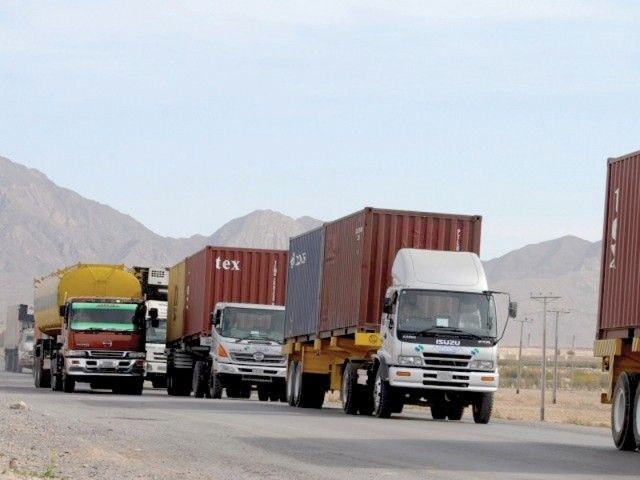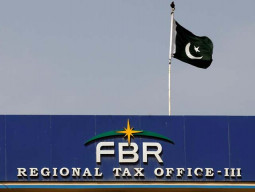
With the emergence of global supply chain, it has become important for countries to have efficient trade logistics to be able to effectively participate in the emerging global value chains. There has been a realisation in the policy circles and donor community in developing countries on the need to improve the logistics performance.
Pakistan's trade deficit amounts to $11.92 billion
This realisation is based on sufficient empirical evidence that links logistics performance to economic growth, and poverty reduction.
The current situation of freight sector
According to the latest economic survey, Pakistan has approximately 264,000 km of road network catering to over 90% of inland freight.
The country has around 220,000 registered trucks where a majority of them include ‘obsolete Bedford trucks’ with rigid suspension.
The trucking sector suffers from a weak regulatory environment resulting in overloading, poor safety and low quality of service. There are also concerns of environmental pollution because of old technology as majority of the fleet comprises transport units which are over 30 years old.
The overloading practices create unhealthy competition and are also responsible in damaging the road infrastructure in the country.
IMF forecasts steep development budget cut
The working conditions of people in this sector are also under criticism due to long hours with continuous driving without proper brake and lack of availability of relaxation facilities on major road networks.
The inefficiency in the freight sector creates economic losses as much as 1% of country’s GDP according to the World Bank’s assessment.
Need for a ‘trucking policy’
The CPEC is going to add additional 3000km of highways that would connect China’s Xingjian province with Gwadar port in Pakistan. There are serious concerns that once Pakistan opens its road transport sectors to Chinese businesses the local trucking sector will face immense challenges in competing with Chinese transporters.
There has been much talk about the new trucking policy under consideration to upgrade the trucking sector to international standards.
There are reports that the lack of consensus within Pakistan has delayed the policy. The modernisation would require considerable tax relief to the sector which may be difficult in view of the existing International Monetary Fund (IMF) programme being followed by Pakistan. The devolution of certain enforcement measures to provinces has also created challenges in improving the regulatory enforcement.
Slowdown in economic reforms could reverse economic gains: IMF
Railways is considered as the most efficient and cost effective mode for the transportation of goods. Around the world, the rail freight has seen tremendous development where rail haulage is being used not only to transport heavy and bulky goods but also consumer goods.
In United Kingdom, the railways transport as much as 75% of consumer goods from factories to distribution points. In Pakistan, the share is decreasing and more and more reliance is being done on road transport which is increasing congestion in the road network.
According to the study of the World Bank, a single freight train can replace one hundred trucks at a time from the road. The railways are also the most cost-effective mode of logistics where one gallon of fuel can transport one tonne of goods to 250 miles compared to 90 miles by road.
The rail network in the sub-continent is the legacy of the colonial administration which built the first railway line in 1858 connecting Karachi to Kotri. Subsequently in 1865, Multan Lahore railway line was made operational for passengers and goods.
In 1947, Pakistan inherited 8200 kilometres of railway network, however, the subsequent government in Pakistan has neglected maintenance and upgrading of railway network and more emphasis has been given by policymakers on road network. Consequently, railways lost capacity to cater to the increasing demand of freight cargo.
Pakistan commits to freer South Asia trade
The CPEC will establish a railway link with China connecting Khunjarab with Havelian in Pakistan. Initially it would cover 800 km route between Havelian and Khunjerab Pass where Havelian is already connected with the main railway network of Pakistan. On the Chinese side a 400km railways will link Pakistan with Kashgar in China.
The experts believe that logistics performance is beyond just the competitiveness of transport related infrastructure and encompasses other areas such as trade facilitation, quality of service providers and market competition. The World Bank every two years publishes the global ‘Logistics Performance Index’ that uses six indicators including trade and transport related infrastructure like roads, railroads and seaports, quality of service providers, efficiency of clearance procedures, ability to track shipments and timelines.
Pakistan’s performance in the global logistics index has been below the global average which has impacted the competitiveness of its companies’ global trade and prevented its integration with global value chains.
The ‘Strategic Trade Policy Framework’ envisages Pakistan as a hub for trade and transit in the region. Logistics performance lies at the heart of trade competitiveness. The policy makers will have to look beyond infrastructure to softer side of competitiveness that include trade facilitation, improving service quality and sustainability of regulatory environment.
The writer is a development professional with over 20 years of experience in public and development sectors
Published in The Express Tribune, January 18th, 2016.
Like Business on Facebook, follow @TribuneBiz on Twitter to stay informed and join in the conversation.

1717587923-0/jake-paul-vs-mike-tyson-(1)1717587923-0-165x106.webp)


1725443747-0/Untitled-design-(5)1725443747-0-165x106.webp)




1731740253-0/BeFunk_§_]_-(21)1731740253-0.jpg)







COMMENTS (4)
Comments are moderated and generally will be posted if they are on-topic and not abusive.
For more information, please see our Comments FAQ